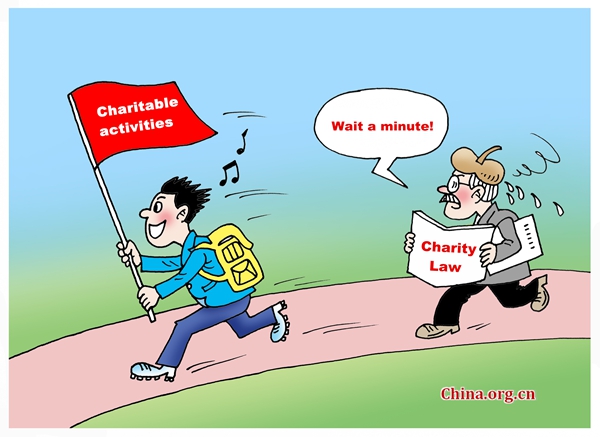


The final touch [By Gu Peili/China.org.cn]
China is often criticized by the West for its poor record in promoting philanthropy. A major reason until now has been the lack of an adequate legal infrastructure to promote the work of domestic and foreign charities in Chinese society. Another contributing factor is a number of fraudulent scandals related to charities leading to public mistrust of many charities and a consequent poor track record of philanthropic giving.
In the West, charitable organizations and NGOs play a major and increasingly important role in modern societies. Now, China is introducing major reforms to both clarify and modernize its approach to charities, for example by making it easier to gain legal status and clarifying tax rules so that philanthropic organizations can better engage with professionals and generally enhance their capacities to carry out important work in education, reducing poverty, improving the environment, and other social causes.
While capitalism is the greatest vehicle ever devised for creating wealth, the system is not perfect and significant gaps arise between social have's and have-not's, and areas exist where market forces and conditions do not exist or work efficiently. In the West, this gap was traditionally filled by churches in local parish work.
However, since the mid-18th century Enlightenment, the role of charities and not-for-profit organizations has expanded and been institutionalized. In the U.S., for example, non-profit activity is well in excess of a trillion dollars and employs millions of people.
China's new charity law establishes a concept of "big philanthropy" and provides a broad definition of "charity." Despite traditionally helping the poor or relieving disasters, the charitable activities will cover most public benefit activities such as education, culture and science. This clarification illustrates that philanthropy in China has expanded from only solving problems of survival to promoting China's comprehensive development.
Article 3: "Charitable activity" as used in this law indicates initiation of the following non-profit activities on a voluntary basis by natural persons, legal persons and other organizations through means such as donating assets or providing services, or voluntarily carrying out the following public interest activities:
(1) Poverty alleviation and assistance;
(2) Support for the elderly, orphaned, diseased or disabled;
(3) Relief from damage caused by natural disasters, disasters caused by accidents, public health incidents and other emergencies;
(4) Promotion of the development of areas such as education, science, culture, health, and sports;
(5) Prevention and control of pollution and other public harms, and protection and improvement of the environment;
(6) Other public interest activities.
For a long time, the Chinese laws created barriers to the registration of NGOs. Many charitable organizations remained unregistered and operated in a legal grey area. Without legal protection, they encountered difficulties in conducting activities, especially fundraising. Philanthropy, like most areas of activity, is also now global and China's old law made it difficult for foreign charitable organizations to operate in China and for Chinese charities to engage and benefit fully from this international network.
Under the new law, permission for these groups to be registered takes place directly with the Ministry of Civil Affairs (MCA). This, and a simplified reporting process, are significant advances and provide greater transparency. It should lead to more unincorporated associations qualifying as legally protected charities.
Furthermore, the number of organizations allowed to register in one administrative area seems no longer to be restricted. These improvements not only simplify the registration procedure, but also will promote more effective NGOs.
Eventually, the new law will open up the private philanthropy sector and break the present monopoly of government organized or connected NGOs. However, those charitable organizations without previous privileged status will not be eligible for fundraising certificates until they satisfy a two-year waiting period after getting registered, plus proving their compliance with the charity law. Given the need and urgency for reform some argue this is overly cautious.
Although criticized as too broadly drafted in terms of vague principles, the tax provisions of the new law are also an important component of the new legal regime. It will hopefully encourage and provide greater certainty to donors and the charities themselves and lead to rapid and confident growth in this important sector. To ensure this happens, however, will require subsequent enactment of detailed regulations and cooperation among the relevant departments.
In both West and East, the philanthropic sector has too often been ignored, poorly understood and underappreciated. Yet, as the poet Henry Wadsworth Longfellow reminds us, "The life of a man consists not in seeing visions and in dreaming dreams, but in active charity and in willing service."
 Beautiful Kapok flowers bloom in Hainan
Beautiful Kapok flowers bloom in Hainan Eye-catching beauties in Chunxi Road of Chengdu
Eye-catching beauties in Chunxi Road of Chengdu Wedding pictures of Wu Qilong, Liu Shishi released
Wedding pictures of Wu Qilong, Liu Shishi released One of world's largest military drills in Saudi Arabia
One of world's largest military drills in Saudi Arabia Iron lady or goddess? Sportswomen's dress show
Iron lady or goddess? Sportswomen's dress show Versatile female soldiers in military camp
Versatile female soldiers in military camp Top beauties in Chinese provinces
Top beauties in Chinese provinces Follow me to my Weibo
Follow me to my Weibo Chinese ships keep close watch on U.S. Navy aircraft carrier strike group in S. China Sea
Chinese ships keep close watch on U.S. Navy aircraft carrier strike group in S. China Sea Top 20 hottest women in the world in 2014
Top 20 hottest women in the world in 2014 Top 10 hardest languages to learn
Top 10 hardest languages to learn 10 Chinese female stars with most beautiful faces
10 Chinese female stars with most beautiful faces China’s Top 10 Unique Bridges, Highways and Roads
China’s Top 10 Unique Bridges, Highways and Roads How prosperous is the city Beijing really?
How prosperous is the city Beijing really?  China will further open market for foreign firms this year: report
China will further open market for foreign firms this year: report  Influenced by Ai Weiwei, a remote village evolves into a lab for performance artists
Influenced by Ai Weiwei, a remote village evolves into a lab for performance artists  Western speech freedom not fit for China
Western speech freedom not fit for China Day|Week